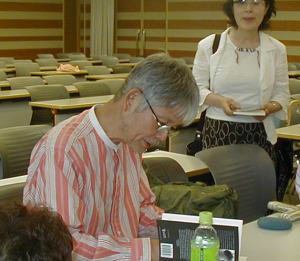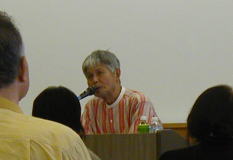Celtic night
―Poem reading by Mutsuo Takahashi―
Irish Lullaby
Over in Killarney
Many years ago,
Me Mither (My Mother) sang a
song to me
In tones so sweet and low.
Just a simple little ditty,
In
her good 'ould' (old) Irish way,
And I'd give the world if she could
sing
That song to me this day.
"Too-ra-loo-ra-loo-ral,
Too-ra-loo-ra-li,
Too-ra-loo-ra-loo-ral, hush now, don't you cry!
Too-ra-loo-ra-loo-ral, Too-ra-loo-ra-li,
Too-ra-loo-ra-loo-ral, that's
an Irish lullaby."
Oft in dreams I wander
To that cot again,
I
feel her arms a-huggin' me
As when she held me then.
And I hear her
voice a-hummin'
To me as in days of yore,
When she used to rock me fast
asleep
Outside the cabin
door.
Too-ra-loo-ra-loo-ral,
Too-ra-loo-ra-li,
Too-ra-loo-ra-loo-ral,
Hush,
now don't you cry!
|
|
On July 2, 2006, in Fukuoka City, there was a beautiful gathering of poem
reading by the world renowned poet Mutsuo Takahashi.
Mr. Takahashi has been one of our most important guests for more than 20 years.
The Celtic Society in Fukuoka City planned 'The Celtic Night' to celebrate
the publication of his new collection of poems "On Two Shores".
Here, the 'two shores' mean a shore in Ireland and a shore in the place where Mr. Takahashi lives now.
To introduce Mr. Takahashi, I will borrow some lines from the 'Introduction'
of the new book. This 'Introduction' was written by Mr. Nobuaki Tochigi.
Since the publication of his first collection of poems Mino My Bull in 1959 when he was twenty two years old, he has written eight collections
of haiku and tanka and more than twenty collections of free verse poems.
He is exceptional among contemporary Japanese poets not only because he
is prolific but also because he goes 'beyond the hedge'. For example, haiku
or tanka poets seldom cross over the specialized confines of the traditional
forms, and poets writing in free verse tend to think of those established
forms as anachronistic and of their music as metronomic. However, Takahashi
has been outstandingly resilient in adapting different forms, including
irregular and experimental vers libre for his own voice. In addition, his explorations in the world of books
and arts has resulted in more than a dozen books of essays with topics
varying from Japanese and Western literature-old and new-to novels, theatre
scripts, even a libretto.
. |
|
Mr. Takahashi visited Ireland three times. The second journey, in 1999, turned out to be a very important experience
 |
|
to him. He and another poet toured around Kerry, Sligo and Donegal, giving poetry readings in Dublin and Belfast. They were greeted with the hospitality of Nuala Ni Dhomhnaill, Cathal O Searcaigh, Theo Dorgan. Peter Sirr and Paula Meeham, among others. The weeks spent in Ireland were decisive for Takahashi in regaining his faith in poetry.
The second reading tour in Ireland was in the summer of 2002.
The new collection of his poems contains those which he wrote after his
tours in Ireland.
Takahashi, says Mr. Tochigi, is an Orpheus of our time. Orpheus Takahashi
wanders in this moderntime Hades of such terrifying things like wars, terrorism,
disease, and natural calamities. Takahashi's concern about the end of this
world often appears in his poems. Ireland is an answer to his deep questions.
It is because, says Takahashi, Ireland has suffered so much at every stage
of her history.
After the poem-reading, we had a party at a cozy Celtic Cafe,
 |
|
where we drank Guinness, ate Irish food, and heard Irish music.
On my way home from Fukuoka that night, a melody suddenly came upon me.
It was familiar to me, and I tried to remember what song it was. Just the
moment the train arrived at my station, I recalled the name of the tune.
"That's an Irish Lullaby"
So, here is a poem by Mutsuo Takahashi, translated into English by Mitsuko
Ohno & Frank Sewell.
Going to the Well
for Cathal O Searcaigh
'Everyone,' he said, 'should have their own well.'
Those words of wisdom, fresh as sun-dried hay,
hit home to us, as we crossed hill after hill
of bogland. Guided down to the bottom of a hill,
we found a well, and as the wooden lid was lifted,
a shallow body of turf-coloured water trembled.
It reminded me of an old abandoned well
in my own backyard far away;
long sealed-up, its water stained with oil.
When I go home, I should clean that well.
Or, first, find and clean the well in me.
The fallen leaves covering up my well
back home are nothing compared to the well
of apathy long stored-up and nursed in me.
Here the water, drawn fresh from the well
and stored in a clay kitchen pot, settled.
Sharp and clear as the blue patch of sky
peeking through a hole in the clouds, it thrilled
my tongue and throat. Everyone should have a well.
|
|
Almost at the same time, Mr. Takahashi's new collection of Haiku was published.
In this book, I found a Haiku that corresponds to his poem of the well.
Rokudo-no i wo kugurebaya yomi no aki.
(The well in Rokudo. If I dived it through, Hades in autumn.)
Thank you for your company, and I hope you will see me again next month.
|




